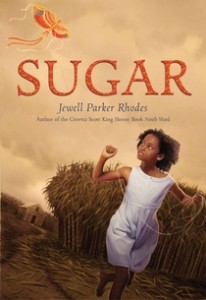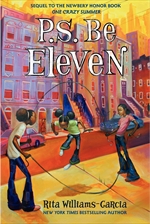It’s another dual review by Janie and Betsy today! We’re teaming up to bring you reviews of two middle grade historical fiction novels during our History Month this October. Set almost 100 years apart, Sugar takes place during Reconstruction in the 1870s, and P.S. Be Eleven takes place in the 1960s. We’ll go through them chronologically; first up is Sugar, reviewed by Janie, and second is P.S. Be Eleven, reviewed by Betsy.
Sugar, by Jewell Parker Rhodes. Little, Brown, 2013, 288 pages. Age/interest level: 8-12
Sugar, age 10, hates sugar and anything with sugar in it. She was born a slave on a Louisiana sugar plantation, and the rough, harsh, mean cane has been her life. Why did her mama name her for that? No answer, because Mama died a few years ago and Daddy’s probably dead too, and Mr. and Mrs. Beale, who are raising her now, can’t raise their eyes from labor long enough to think about anything else. Billy Wills, the owner’s son, is her only friend—but is he a true friend? And for how long? Especially after Mr. Wills decides to import China men—from China!—to work the cane alongside the former slaves.
Most of the blacks feel threatened by this development, but to Sugar, it opens up new worlds and ways of thinking:
If Chinese men can come to Louisiana, I can go there—China. If African men can come to America, I can go there too—Africa. The land where Bre’er Rabbit and Hyenas live! China—the land where Cat, Rat, and Ox live. Inside my shack, I twirl like a leaf spun by cool wind.
Sugar’s voice is vivid, and her story is engaging and unique, taking place in an under-represented period of American history (Reconstruction, 1870). That said, it seems a bit by-the-numbers: the freed slaves and the Chinese, after a brief prickly period, get along famously. There are no bad apples in the crop, in contrast to the whites and a typically cruel and vindictive overseer. The Wills family seem decent, if clueless, and though their friendship is tested, Billy remains a friend.
- Worldview/moral value: 3 (out of 5)
- Literary value: 4
P.S. Be Eleven by Rita Williams-Garcia. Amistad, 2013. 288 pages. Age/interest level: 8-12.
Does that cover entice you, or what? Do judge the book by its cover. P.S. Be Eleven is every bit of urban life for three sisters in the 1960s and an engaging read. A follow-up to Newbery Honor-winning One Crazy Summer, P.S. Be Eleven stands on its own two feet, summarizing enough of the first book to catch new readers up.
In P.S. Be Eleven, 11-year-old Delphine (the oldest) is once again the focus. She’s entering sixth-grade and is worried about all the usual 11-year-old, sixth grade issues: her first boy-girl dance at the end of the year, not wearing “cool” clothes, desperately hoping to go to her first concert (Michael Jackson and the Jackson Five!), and navigating the often turbulent friendship waters typical of this age. On top of that, Delphine’s father is seeing a new woman (her mother is back in California and is now writing Delphine letters), her uncle returns from Vietnam with some issues, and Big Ma assumes Delphine is going to keep her younger sisters in line.
Some historical fiction revolves around a historical event (such as the Revolutionary War) while other historical fiction takes a basic plot, places it in a particular time and place, and lets that time and place dictate the particulars. Such is P.S. Be Eleven. Even though I wasn’t alive in the 1960s, I can feel the 1960s in all its glory and turmoil in this book. In addition, Delphine and her family members are all memorable, authentic characters.
This is a stronger, more well written novel than its predecessor, and I think it’s one to keep an eye on come award season (we’ll see if I’m right!). Note that this novel will bring up some issues: divorce/re-marriage, drug-abuse and its effects, media idolization. These are great topics to discuss with middle schoolers! P.S. Be Eleven doesn’t offer many answers, but it certainly shows the ups and downs involved which are great starting points for discussion. Nothing is inappropriate for the target age group; in fact, Williams-Garcia deftly shows just what can happen with, say, drug abuse, without going into too much detail.
- Worldview value: 3.5
- Literary value: 4.5
If you’ve read one of these novels, we’d love to know what you think! You might also be interested in our review of One Crazy Summer. If you’re more of a nonfiction history buff, be sure to check out the round-up of general history books earlier this week, see what a picture book biography should deliver, or browse our “historical fiction” tag for lots of other reviews, many of which target middle grades.
cover images from publishers’ websites (Sugar from Little, Brown and P.S Be Eleven from HarperCollins Children’s)
Support our writers and help keep Redeemed Reader ad-free by joining the Redeemed Reader Fellowship.
Stay Up to Date!
Get the information you need to make wise choices about books for your children and teens.
Our weekly newsletter includes our latest reviews, related links from around the web, a featured book list, book trivia, and more. We never sell your information. You may unsubscribe at any time.
We'd love to hear from you!
Our comments are now limited to our members (both Silver and Golden Key). Members, you just need to log in with your normal log-in credentials!
Not a member yet? You can join the Silver Key ($2.99/month) for a free 2-week trial. Cancel at any time. Find out more about membership here.



